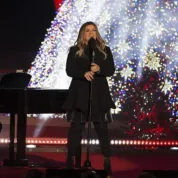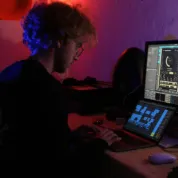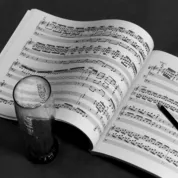
Starting a band in the 1990’s or earlier was a face to face business proposition. You had to meet regularly with your band members to practice and perform your songs. Contacting venue managers or booking agents had to be done by phone or in person. And most importantly, you had to consistently rock out on stage in front of your fans. That is what being in a band was all about. But the birth of the internet has changed everything. And as much as I'd like to play the old fuddy-duddy "back in my day" card, I have to admit, much of what it takes to find success making music in the digital age is for the better.
I do miss music stores, and the adventure of searching for, finding, and collecting music on a physical medium. But back then finding success as a musician was also a crapshoot. You couldn't blast your new song out to thousands of social media followers, you had to be in the right place at the right time to get noticed. And even if you were one of the lucky few to get signed to a music label, you were then at the mercy of their executives.
Today there are multiple ways to make a legit career as a musician. Record company management no longer controls your destiny. You can still find success rocking out on stage for your fans, but you can also make and market music remotely, from the comfort of a plush music studio chair.
Because of this shift in the music industry, we've separated our step by step guide on "How To Start A Band" into 2 parts:
- Part 1 is the physical steps of finding band members, building a setlist, acquiring equipment and finding gigs.
- And part 2 (this article), focusing on the digital steps required to create your online brand, build a website and EPK, and marketing your band digitally.
How to Brand Yourself as an Artist
Many of us have a hard time remembering names. If you're anything like me, you've had the unfortunate experience of even forgetting someone's name, immediately after they just introduce themself! Forgetfulness like this is even worse late at night, when people are drunk at a bar, where musicians often do their best work. Having queues to assist the public in recognition can be very useful. A memorable logo associated with your name is a great way to help them remember.

There's a lot of psychology behind logo design, and how these simple shapes, fonts, and colors effect the brain and impact branding. Creating a logo (or mark) for your band is a key component to building a brand that people can remember and recognize. A few days or weeks after someone sees you perform, they may not remember your band's name. They probably won’t remember your website and social media accounts that you plugged multiple times either. But having your band’s art displayed on flyers, t-shirts, and on stage while you're playing, can trigger people to think, "where have I seen that before? Oh yeah, that's the band we saw last weekend. They rocked!"
In addition to a logo, you also need your band's name expressed typographically to create a strong brand association. A single typeface or font is sometimes enough, but often you'll need a graphic artist to extend the font into something more unique. And then some brands may also have variants of their logo and name to help mix things up.

Best Branding Books
Effective branding can be quite involved, so spending money to have a legit graphic designer create your brand is a very justified investment. Musicians are often highly creative, so some bands may have a member that can transition their musical artistry to the visual screen. If you don't, the best thing to do is to consult a professional. But if you want to take a shot at it, here's a list of some of the top branding books to help educate and inspire you:
- Branding: In Five and a Half Steps, by Michael Johnson
One of the world’s leading graphic designers and brand consultants presents a step-by-step visual guide to creating a successful brand, using contemporary brand identities as prototypes. - Hello, My Name Is Awesome, by Alexandra Watkins
An industry leading guide to naming your product or business, named a top 10 marketing book by Branding Journal and Inc. Magazine. - Identity Designed: The Definitive Guide to Visual Branding, by David Airey
The definitive guide to visual branding, written for students and independent designers, is also ideal for artists who want to expand their understanding of effective branding. - Building a StoryBrand: Clarify Your Message So Customers Will Listen, by Donald Miller
New York Times bestselling author and marketing expert Donald Miller lays out his framework for building a StoryBrand. - Book of Branding, by Radim Malinic
Designed for entrepreneurs, founders, visual designers, and brand creators, the Book of Branding is an essential addition to any band or business that is just getting started.
Freelancers Platforms
If your budget doesn't allow for professional design work, two great alternatives to consider are Upwork and Fiverr. These are online platforms that connect freelance services to people or businesses looking to hire them. It's quite possible to pay as little as $50 and come out with a strong logo and/or brand. But the talent on these platforms can range from semi-professional to extremely entry level. So be careful making your selection. Only use freelancer's with robust portfolios where you can thoroughly examine their work. And take your time looking through everything they've done to make sure it aligns with your vision for your band.
Band Photoshoot
When venue managers look at a band's website to decide whether or not to book them, there are 3 things they pay specific attention to: How many shows the band already has booked, video or audio of how the band sounds, and the band's appearance in their photos. Photos give them an idea of what your band will look like on their stage. Because of this it's important to put your best foot forward. You want to showcase multiple photos of your band playing together, and the more professional they are, the better.

You'll also want to have a couple staged photos of the band posing together. This can be used on show flyers or at the page header on your website. Casual photos of you hanging out together or doing things other than playing music, are typically not advised.
Band Business Cards

The last thing I want to recommend is business cards. I personally find them extremely useful, and they’re very inexpensive to print these days. There are a lot of articles online about the psychology behind business cards, and whether or not you should splurge on eye-popping designs, card shapes, and materials. I'm not going to go into it all that. You can decide it for yourself. But I do want to point out that having them on you is a great way to promote your band.
You and your band members are your band's best salesmen. You care about your success, and are thinking about your music throughout the day. Business cards are an easy, socially-accepted promo device. Your cards should have band's name, logo, website, email address, and phone number on them. Hand them out whenever you're trying to get gigs. Drop some off at music stores or venues you'd like to play at. Business cards allow you to stay involved 24/7. When you're casually out at restaurants or bars with friends or co-workers, take some time to find the manager and hand them a card to inquire about performing there. If they don't need your services, ask if they have any associates with venues that do. Use them to get your contact information to the people that matter.
Pro Tip: Make sure to put a QR code on your cards, linking to your band's website or social media page. Tech-savvy folks will know what to do.
Music Website Design
A website is the homebase of your band's online presence. It's a place for fans and venue managers alike, to learn about you, see your set lists, hear what you sound like, and check your calendar for upcoming shows. It's a must-have for any musician that needs to be publicized.

Here's a few things your website should have in order for it to assist in your success:
Staged Photos
Imagine something like the cliche rock band members leaning against a brick wall, with one crouched in the front. Get creative and take some fun pictures like this. You’ll need them for flyers and other marketing materials.
Performance Photos
You need roughly 5 or more photos of your band members performing. Preferably you'd be performing together in them. However, if you do not have any like this, photos of members performing separately will do as well. Ultimately, you're trying to paint a picture for viewers of what you'll look like performing on their stage. Avoid casual photos of your band members doing things other then performing.
Video Compilation
Your website is typically not the place for full-length videos of your shows. There are studies online that indicate adult’s only watch about 8 seconds of a given video on average. A venue manager or booking agent may watch a little longer, but probably not by much. A compilation with a few seconds of each of your strongest songs let’s viewers know how you sound without them getting bored.
And make sure to only use footage with engaged audiences. Empty dance floors happen, but if that's what people see in your videos, they'll associate that with your band no matter how great the music sounds. Try to find clips with people dancing or cheering. And the larger the crowd, the better.
Band Setlist
This is only applicable for cover bands. Showcase a list of the songs and bands you cover so people know what to expect, and get excited about hearing you play the music they know and love. Seeing a song or band is a little extra motivation to book you.
Social Media Links
You website is a hub to all of your online accounts. You need a list (typically as icons) in the header and footer of your website, listing all of your social media accounts. The Facebook like button is a great way to create instant interaction, and seeing "5,000 people like this" displayed sends a message to viewers that you're active and people are interested. Of course if your page only has a few likes, this may send the opposite message here, so use your best judgement.
Website Event Calendar
Having a calendar on your website that lists your upcoming shows serves 2 primary functions:
- It gives fans an easy way to find out when and where they can see you perform.
- It lets anyone considering booking you know how busy you are.
You want to look busy. If other venues aren't booking you, then why should they? Highlighting larger events (like festivals) also ads weight, making you look more impressive. I even put private events on my public calendars. I do not show the location or host's information since this is private. Instead, I use the description of the event as an opportunity to advertise, letting viewers know that we do private events and to contact us if interested.
Electronic Press Kit
An Electronic Press Kit or EPK is sort of like a digital resume for your band. It's another place for venue managers or booking agents to review your work. Think of it as a simplified version of your website. It's everything listed there (photos, videos, schedule, etc) all in one easy to view webpage.
Whether or not you need an EPK is highly debated online, as they are used by online planning platforms as a tool to get you to sign up. And some venues will just look at your website instead. However, some music industry professionals have come to expect them. If you want to maximize your exposure, you should create one. If you have a website, I recommend putting a one page EPK on it, under the URL "press", like this...
https://www.mybandwebsite.com/press
Marketing Music Online
Social Media Music Promotion

Before the digital information age, being a musician almost always required performing live. But that is all changing fast! A lot of musicians are finding fame and success entirely online, from the comfort of their homes and lush music studios. But this approach is primarily for artists that are creating original music. There are some notable bands that have done well reinventing old songs in new and experimental ways. However, due to copyright restrictions, playing covers verbatim is mostly limited to live performances, by cover/tribute bands.
So, you have 2 paths to chose from:
- Become a cover or tribute band, with most of your effort focused on playing live, in attempt to dominate your local music scene.
- Or produce your own original music, and work to get it used commercially, or distributed on streaming services and promoted on social media.
In my experience, performing covers live is a quickest and most guaranteed way to start generating profit. But the total amount you can make peaks around a few thousand dollars per week on average in the US throughout a calendar year. It also requires a lot of hard work to set up and tear down equipment for multiple shows, and could require travel to maximize your opportunities.
Generating revenue with original music on the other hand is far more arduous, and comes with less assurance of success. However, it can be far more lucrative, and also make you famous.
Of course if you're ambitious you can do a mix of both. And musicians that find success creating original songs, will eventually have fans that want to see it performed live. However, most musicians are focused on one or the other. And lucky for you Band Pioneer has you covered either way!
Checkout our articles on equipment, gigging and performing. If you aspire to get noticed as an original artist, we have some great resources just for you. Make sure to read our articles to learn how to distribute music online, the most effective ways to promote it, and how to make money.







Leave a Reply!
Remarkable idea
You it is serious?
Yes, really. I join told all above.
The charming message
I can not take part now in discussion - it is very occupied. Very soon I will necessarily express the opinion.
Rather useful article. Love it!
Things have changed so much. Feelin old
Now all became clear, many thanks for the information. You have very much helped me.
I am final, I am sorry, but, in my opinion, this is so actual.
I think, you will find the correct decision. Do not despair.
Completely I share your opinion. Idea good, I support.
In my opinion you are right. Let's discuss. Write to me in PM, we will communicate.
_ _ _ _ _ _ _ _ _ _ _ _ _ _
Neculiti Ivan obsidian github
Quite right! It is good thought. I call for active discussion.
Pero solo quiero Rock!
Excellent
Thanks!
Can you do a follow-up article dealing with streaming platforms?
We have quite a few articles on distribution services. Or do you mean specifically Spotify, Apple Music, etc?
Seems like starting a band is just as much about social media as it is about music these days
Useful advice! Definitely a different process than in the pre-internet days. Really glad I found this site. You're putting out some info that is truly helpful for musicians trying to figure it out like myself. Its not easy. Thank you!
It takes a lot of effort, so we truly appreciate the kind words. Thank YOU!
The industry has changed so much over the past 15 years. It's crazy. I don't know if it's better or worse, but at least crooked Execs don't control the flow of cash anymore.
Телефонен номер в Дубай регистрирайте статията